In today’s highly competitive business landscape, enterprise businesses are continually seeking ways to improve efficiency and streamline operations. One of the most powerful tools available to them is Oracle ERP (Enterprise Resource Planning). Oracle ERP has long been a cornerstone in enterprise business operations, providing comprehensive solutions for managing financials, supply chain, manufacturing, and human resources.
Toc
- 1. Introduction of Oracle ERP and Cloud Integration
- 2. Understanding Oracle ERP Cloud Integration Options
- 3. Benefits of Cloud Integration with Oracle ERP
- 4. Related articles:
- 5. Real-world Applications and Success Stories
- 6. Implementing Cloud Integration with Oracle ERP
- 7. Comparative Analysis: Oracle ERP vs. Other ERP Systems
- 8. Conclusion
A standout feature of Oracle ERP is its robust cloud integration capabilities. This article will delve into the intricacies of Oracle ERP cloud integration, its benefits, real-world applications, and how businesses can implement it effectively.
Introduction of Oracle ERP and Cloud Integration
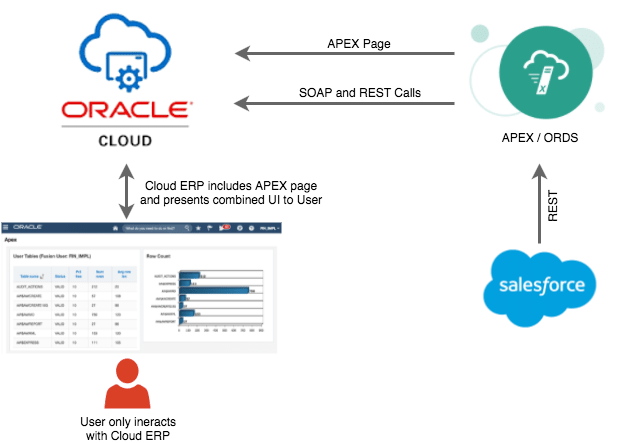
Oracle ERP is a suite of software applications designed to automate core business processes. These processes include accounting, finance, project management, procurement, risk management, and compliance reporting. Oracle ERP helps businesses manage their day-to-day operations efficiently and effectively through one integrated system.
With the rise of cloud computing, Oracle has expanded its offering to include cloud-based versions of its ERP software. The integration of these two powerful tools – Oracle ERP and cloud technology – creates a potent combination that enables businesses to benefit from increased flexibility, scalability, and connectivity.
How Oracle ERP Works with Cloud Integration
Oracle ERP cloud integration is the process of connecting Oracle ERP applications to cloud-based services. This integration allows for seamless communication and data exchange between the on-premise systems and the cloud, providing a unified view of all business operations.
The integration works through APIs (Application Programming Interfaces) that enable different software applications to communicate with each other and share data. These APIs act as a bridge between the on-premise ERP system and various cloud platforms, allowing for real-time data transfer and synchronization.
Oracle ERP and Cloud Integration Benefits
The main benefit of integrating Oracle ERP with the cloud is that it gives businesses access to a wide range of cutting-edge capabilities, such as real-time data analytics, enhanced collaboration, and increased efficiency.
By leveraging cloud technology, businesses can also reduce their IT infrastructure costs by eliminating the need for expensive hardware and software installations. This also results in simpler maintenance and upgrades.
Moreover, with cloud integration, businesses can easily scale their operations up or down as needed without worrying about capacity limitations. This flexibility is especially valuable during peak seasons or when sudden changes in demand occur.
Real-World Applications of Oracle ERP and Cloud Integration
The use cases for Oracle ERP and cloud integration are vast and varied. One example is in finance management, where businesses can use cloud-based analytics to gain better insights into their financial data and make more informed decisions.
Another application is in supply chain management, where businesses can leverage real-time data from the cloud to optimize inventory levels and improve delivery times. This integration also enables seamless collaboration between different departments within an organization, enhancing overall efficiency and productivity.
Understanding Oracle ERP Cloud Integration Options
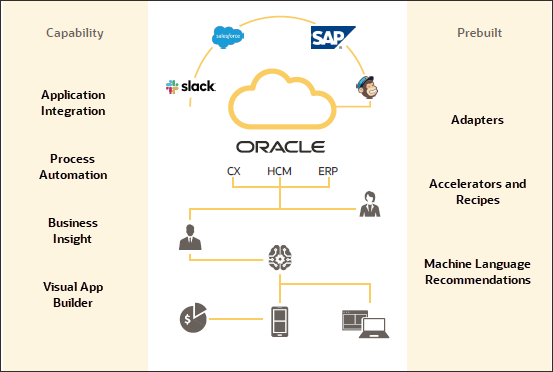
Businesses can choose from multiple options when it comes to integrating their Oracle ERP system with the cloud. These options include:
- Hosted Integration: This approach involves hosting the integrated solution on a third-party server, providing businesses with access to a dedicated team of experts who handle maintenance and support.
- Hybrid Integration: In this method, businesses use both on-premise and cloud-based solutions, with data transfer between them taking place through a secure connection.
- Real-Time Integration: This option enables real-time data transfer and synchronization between the on-premise ERP system and various cloud applications, providing businesses with up-to-date information for more accurate decision-making.
What is Cloud Integration?
Cloud integration is the process of configuring multiple cloud-based systems to function cohesively within a single IT ecosystem. By utilizing cloud integration, businesses can streamline workflows, improve data visibility, and ensure more cohesive and efficient operations across their various software services. Whether through APIs, middleware, or other integration tools, cloud integration seeks to bridge the gap between disparate systems, facilitating unified access to data and services for better operational synergy.
Key Considerations for Successful Oracle ERP Cloud Integration
Successful integration of Oracle ERP with cloud services requires thorough planning and strategic execution. Here are some key considerations:
- Data Security and Compliance: Ensuring the security and compliance of data transferred between systems is paramount. Businesses need to adopt robust security measures such as encryption, access controls, and compliance checks to protect sensitive information.
- Seamless Data Synchronization: Achieving seamless synchronization of data between the on-premise ERP system and cloud applications is critical. This involves regular monitoring and management to ensure the accuracy and consistency of data across all platforms.
- Scalability and Flexibility: Businesses should choose integration solutions that can easily scale with the growth of their operations. They should look for flexible options that can accommodate changes in business requirements and evolving technologies.
- Cost Management: While cloud integration offers cost-saving benefits, it is essential to keep track of integration expenses. Businesses should conduct cost-benefit analyses to ensure the long-term economic viability of their integration strategies.
- Vendor Support and Compatibility: It is important to select vendors and integration solutions that offer comprehensive support and are compatible with existing Oracle ERP systems. This ensures smooth implementation and minimizes the risk of disruptions.
Benefits of Cloud Integration with Oracle ERP

Integrating Oracle ERP with the cloud offers numerous benefits, including:
- https://bargame.xyz/mainframe-computers-in-the-cloud-era-bridging-tradition-with-innovation/
- https://bargame.xyz/alienware-computers-the-pinnacle-of-gaming-excellence/
- https://bargame.xyz/alienware-gaming-pc-the-ultimate-gaming-machine/
- https://bargame.xyz/artificial-intelligence-in-digital-marketing-how-ai-chatbots-revolutionize-customer-engagement/
- Enhanced Efficiency: With real-time data transfer and synchronization, businesses can improve their efficiency by eliminating manual data entry processes and ensuring accurate and up-to-date information.
- Increased Collaboration: Cloud integration enables seamless collaboration between departments, allowing for better communication and teamwork within an organization.
- Better Decision-Making: Real-time access to data from various sources allows businesses to make more informed decisions based on accurate and up-to-date information.
- Cost Savings: By eliminating the need for costly hardware and software installations, businesses can reduce their IT infrastructure costs significantly.
- Scalability: Cloud integration provides businesses with the flexibility to scale their operations as needed without limitations or disruptions.
- Improved Performance: With data stored and processed in the cloud, businesses can experience faster performance, especially during peak seasons or high-demand periods.
Improved Scalability and Flexibility
Cloud integration with Oracle ERP significantly enhances both scalability and flexibility for businesses. Traditional on-premise ERP systems often faced limitations in accommodating rapid growth or sudden changes in business needs. However, by integrating with the cloud, businesses can easily scale their operations up or down in response to market demands without the need for substantial infrastructure investments. This dynamic scalability ensures that resources are efficiently allocated and performance remains optimal during peak periods.
Moreover, the flexibility of cloud integration allows businesses to quickly adapt to new technological advancements and market trends. Cloud platforms frequently update their features and capabilities, providing organizations with cutting-edge tools and solutions without the downtime associated with traditional software upgrades. This adaptability is crucial for maintaining a competitive edge in today’s fast-paced business environment.
Enhanced Disaster Recovery and Business Continuity
Integrating Oracle ERP with cloud solutions also strengthens disaster recovery and business continuity strategies. Cloud providers typically offer robust backup and recovery services, ensuring that critical data is protected and can be swiftly restored in case of system failures, cyber-attacks, or natural disasters. This added layer of security minimizes downtime and ensures that business operations can continue with minimal disruption, safeguarding both revenue and reputation.
Cost Savings and Reduced IT Infrastructure Maintenance
Cloud integration with Oracle ERP also presents considerable cost-saving opportunities for businesses. By eliminating the need to invest in expensive on-premise hardware and software, organizations can significantly decrease their IT infrastructure costs. This reduction extends beyond initial investments, as cloud integration can also reduce ongoing maintenance expenses associated with traditional ERP systems.
Additionally, by utilizing the cloud-based resources of their integration provider, businesses can free up their IT staff to focus on other critical tasks, saving both time and money.
Real-world Applications and Success Stories
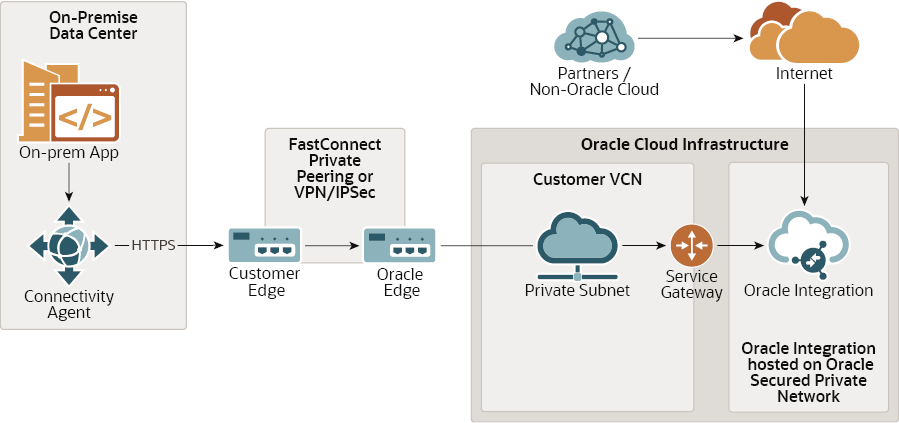
Cloud integration with Oracle ERP has already proven to be a game-changer for many businesses across various industries. Here are some real-world applications and success stories:
Nestle
Nestle, a global leader in the food and beverage industry, has successfully implemented Oracle ERP cloud integration to optimize its supply chain management and financial processes. By integrating their ERP system with cloud-based analytics and reporting tools, Nestle has achieved greater visibility into their operations, resulting in improved decision-making and operational efficiency.
Procter & Gamble
Procter & Gamble (P&G), a multinational consumer goods corporation, has also leveraged Oracle ERP’s cloud integration capabilities to streamline its human resources and financial operations. The integration has enabled P&G to automate routine tasks, enhance data accuracy, and improve overall productivity.
Implementing Cloud Integration with Oracle ERP
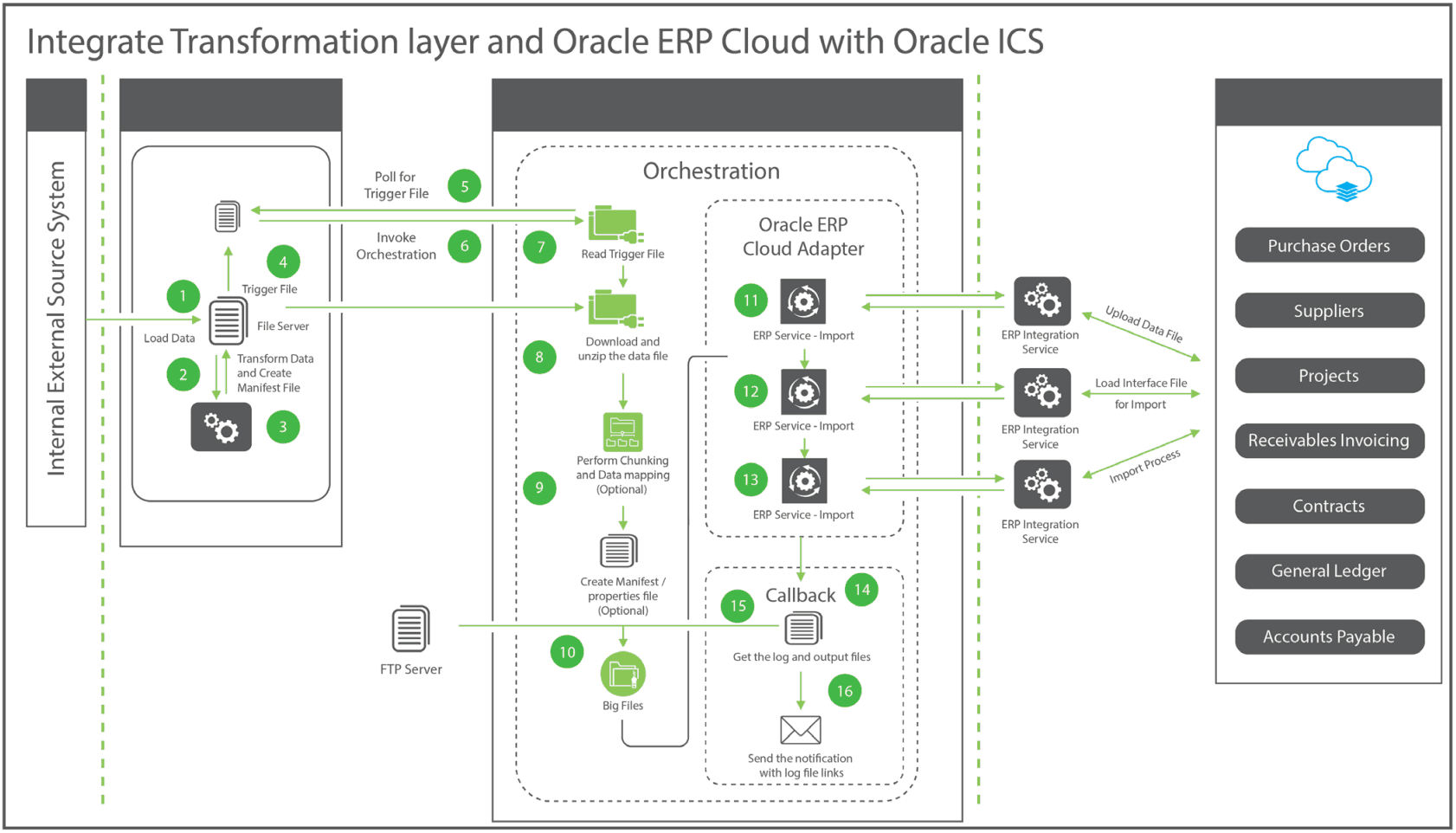
Steps for Integration
- Assessment and Planning: Begin by assessing the current state of your IT infrastructure and identifying the specific business needs that cloud integration can address. Develop a detailed integration plan outlining the scope, timeline, and resources required.
- Selecting the Right Tools and Services: Choose the appropriate Oracle ERP cloud integration tools and third-party services that align with your business objectives. Collaborate with Oracle or certified partners to ensure proper implementation and support.
- Data Migration and Testing: Migrate your data to the cloud and conduct thorough testing to ensure seamless integration and functionality. Address any issues or discrepancies before going live.
- Training and Change Management: Provide comprehensive training to your employees on the new system and implement change management strategies to ensure a smooth transition.
Best Practices for Smooth Integration
Ensuring a smooth integration of Oracle ERP with cloud platforms involves adhering to several best practices that can mitigate risks and streamline the process:
- Engage Stakeholders Early: Involve key stakeholders from various departments in the planning and implementation process. Their input can provide valuable insights and help identify potential challenges early on.
- Develop a Clear Communication Plan: Establish a communication plan that keeps all relevant parties informed throughout the integration process. Regular updates and transparent communication can prevent misunderstandings and keep the project on track.
- Implement Robust Security Measures: Protecting sensitive data should be a top priority. Implement comprehensive security protocols, including data encryption, access controls, and compliance with industry standards and regulations.
- Optimize Data Quality: Ensure that the data being migrated to the cloud is accurate, clean, and well-organized. Poor data quality can lead to integration issues and hinder the overall effectiveness of the system.
- Conduct Regular Testing: Continuous testing during the integration process can help identify and rectify issues before they escalate. Utilize both automated and manual testing methods to cover all aspects of the system.
- Monitor Performance Post-Integration: After the integration goes live, continuously monitor system performance to ensure everything operates as expected. Address any performance bottlenecks or issues that arise promptly.
- Gather Feedback for Continuous Improvement: Collect feedback from users and stakeholders to understand how the new system is performing and identify areas for improvement. Regularly updating and optimizing the system can lead to sustained success.
Comparative Analysis: Oracle ERP vs. Other ERP Systems
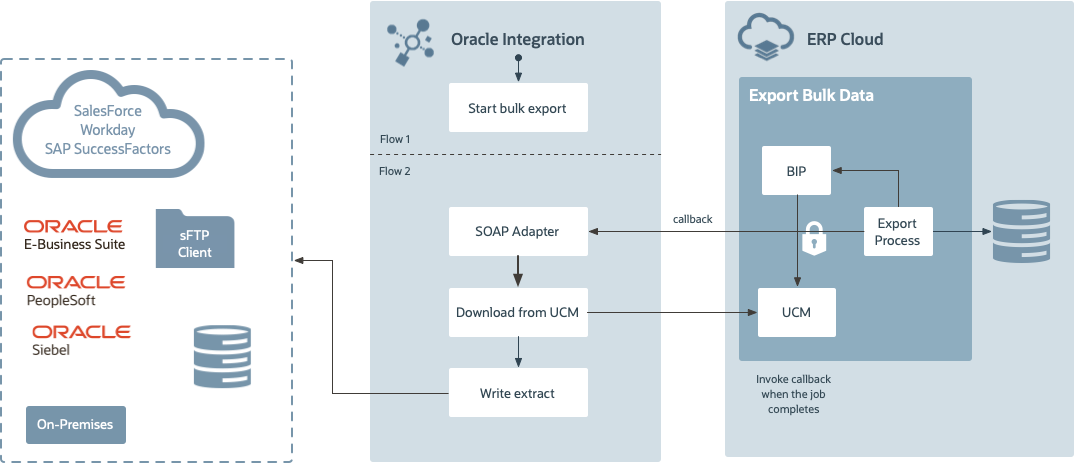
Oracle ERP Cloud Integration
Oracle ERP stands out for its robust cloud integration capabilities, offering seamless connectivity with a wide range of cloud-based applications. The platform’s scalability, security, and comprehensive suite of tools make it a go-to solution for many enterprise businesses.
SAP S/4HANA Cloud Integration
SAP S/4HANA is another leading ERP system known for its powerful in-memory computing capabilities and real-time data processing. While it offers excellent cloud integration features, some businesses find it more complex and costly to implement compared to Oracle ERP.
Microsoft Dynamics 365 Cloud Integration
Microsoft Dynamics 365 offers strong cloud integration with Microsoft’s suite of productivity tools, making it a popular choice for businesses already invested in the Microsoft ecosystem. However, it may not offer the same level of industry-specific functionality as Oracle ERP for certain enterprise needs.
Conclusion
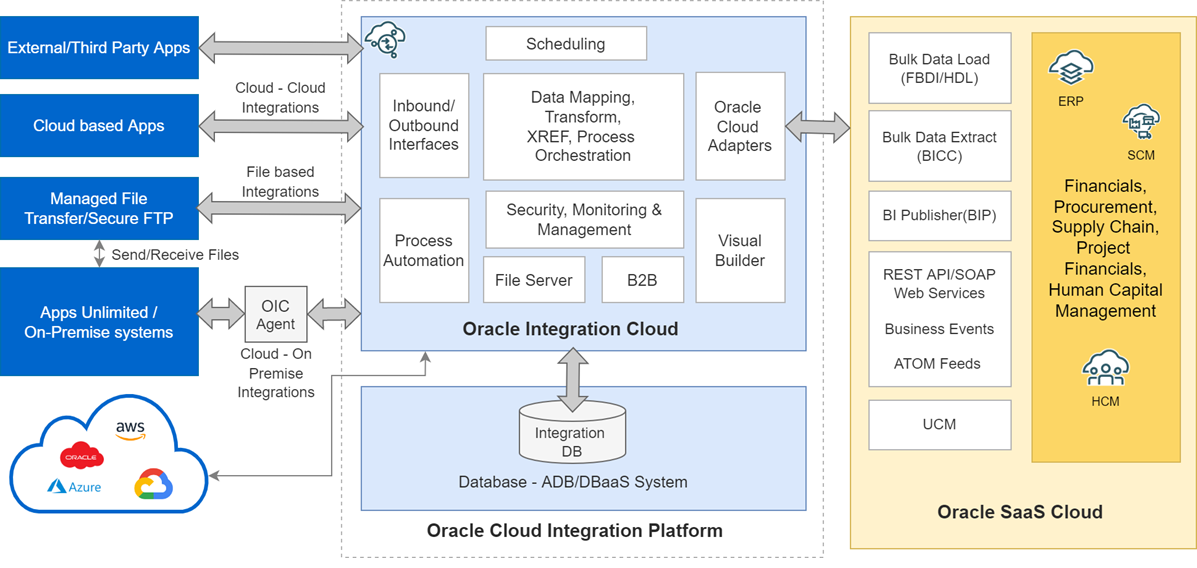
Oracle ERP’s cloud integration capabilities provide enterprise businesses with the tools they need to stay competitive in an ever-evolving market. From improved scalability and enhanced security to significant cost savings, the benefits are clear. By following best practices and learning from real-world success stories, businesses can effectively implement Oracle ERP cloud integration and unlock new levels of efficiency and innovation.
For enterprise businesses looking to modernize their operations and gain a competitive edge, Oracle ERP with cloud integration is a powerful solution worth considering. Explore the potential of Oracle ERP today and take the first step towards transforming your business.









